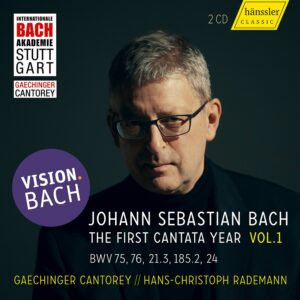VISION.BACH
Johann Sebastian Bach (1685-1750)
Cantatas from the 1st to 4th Sunday after Trinity of the 1st Leipzig year 1723
BWV 75 “Die Elenden sollen essen” (Cantata for the 1st Sunday after Trinity, Leipzig 30.5.1723)
BWV 76 “Die Himmel erzählen die Ehre Gottes” (Cantata for the 2nd Sunday after Trinity, Leipzig 6.6.1723)
BWV 21.3 “Ich hatte viel Bekümmernis” (Cantata for the 3rd Sunday after Trinity, Leipzig 13.6.1723)
BWV 24 “Ein ungefärbt Gemüte” (Cantata for the 4th Sunday after Trinity, Leipzig 20.6.1723)
BWV 185.2 “Barmherziges Herze der ewigen Liebe” (Cantata for the 4th Sunday after Trinity, Leipzig 20.6.1723)
Gaechinger Cantorey
Hans-Christoph Rademann
Hänssler CLASSIC 2 CDs HC 23025

